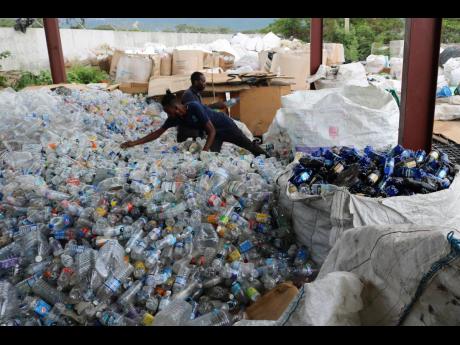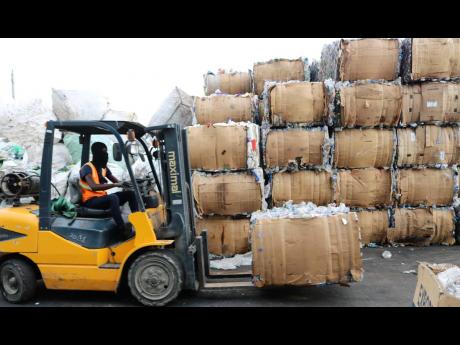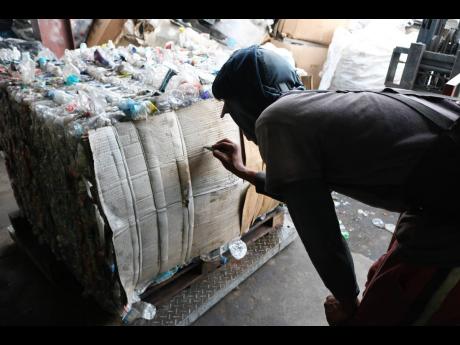Recycle Partners flooded with plastic bottles
Jamaicans have been flooding the Recycling Partners of Jamaica (RPJ) cages and depots with plastic bottles, so much so that the organisation has been unable to offload them for export fast enough, thereby creating a backlog that is not likely to be cleared any time soon.
Chairman of the RPJ board of directors, Dr Damien King, made the disclosure recently during a tour of the company’s Lakes Pen depot in St Catherine by participants in a regional workshop on ‘Marine Plastic Pollution in the Caribbean Region’.
Data gathered up to July shows that the RPJ is collecting about 12.3 million bottles a month, and according to King, this has nothing to do with the monetary incentive which works out to about $1 per bottle.
“We know it has nothing to do with that because a large majority of the bottles that we are collecting, of that 12 million, are from people just putting them in the cages which we have been installing across the country. We installed our first cage in December 2020 and we now have nearly 300 cages that we have put into schools, residential complexes, commercial establishments and people don’t get paid, they don’t redeem the deposits when they bring their plastic bags full of bottles and put them in those cages – they are just doing the right thing.
“So what we have discovered is that there is a lot of latent desire to recycle by people who have no interest in the deposit, and every time we put out a cage, people respond. We have been putting out cages at the rate of roughly 20 a month and every time we put a cage, people fill it up,” he told The Gleaner.
The response has been so strong, it far exceeds the RPJ’s capacity to crush and bale the bottles in preparation for export.
“We are now overwhelmed with bottles that we cannot process fast enough. When I say overwhelmed, the situation at our main depot at Lakes Pen is one where you can barely find space to walk or to drive in because we have so many unprocessed bottles,” Dr King admitted.
In fact, if the public responds favourably to the incentives scheme, the RPJ could be further overwhelmed.
“The take away point is that incentivising people to bring in more bottles is going to create a greater problem,” according to Dr King.
The organisation recently apologised to some of the institutions where it had placed cages, explaining that the reason they had not been cleared is that RPC did not have space for the bottles at the processing depot.
“So the problem we have is that out processing capacity is inadequate and I take personal responsibility for that because as much as have been getting trucks and putting cages out there and trying to open depots, we just haven’t done it fast enough for the demand. The problem is that we weren’t prepared for the amount of bottles that are coming in, so I give this minister (Matthew Samuda) credit and respect because he is the first minister responsible for the environment who actually cares about the environment.”
DOING MUCH MORE
All the PET (polyethylene terephthalate) and HDPE (high density polyethylene) bottles collected by the RPJ are baled prior to export and up to July it had moved 3.3 million pounds. However, the organisation has its sights set on doing much more with the plastic bottles it collects.
“We are hoping to take the processing of the plastic that we collect to a next stage, which is producing plastic flakes. This is a process of cleaning and washing the plastic into small flakes. Now that has the advantage of being more efficient in shipping because then you are shipping less air, so we have plans in place to take it to that next stage, but that’s not where we are going to stop,” Dr King shared with The Gleaner.
“We know that at least one drinks manufacturer in Jamaica is looking seriously into using recycled plastic pellets in the manufacture of new bottles and then we would end doing a closed loop and there is no exporting at all. So all of this is in train but the bottleneck is processing capacity.”



